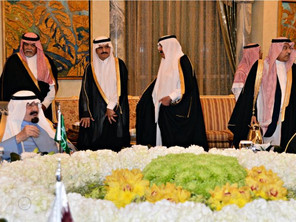 Riyadh, Nov 18: Three leading GCC countries — Saudi Arabia, UAE and Bahrain — have resolved their eight-month-old dispute with another GCC member Qatar on Sunday and decided to send back their ambassadors to Doha.
Riyadh, Nov 18: Three leading GCC countries — Saudi Arabia, UAE and Bahrain — have resolved their eight-month-old dispute with another GCC member Qatar on Sunday and decided to send back their ambassadors to Doha.
The move initiated by Custodian of the Two Holy Mosques King Abdullah has been widely welcomed by foreign diplomats, journalists and scholars in the Kingdom.
The annual GCC summit would now take place on Dec. 9 and 10 in Doha, the GCC said in a statement. The Gulf leaders stated this would see a new phase of relations, which would provide stability as the region faces several economic and political challenges ahead.
“We ask God to protect the GCC states from harm and danger, and to sustain its security, stability and prosperity moving forward,” the statement said. The GCC leaders also urged all members to redouble their efforts to protect the Gulf’s people.
The emergency GCC summit in Riyadh was attended by leaders from Saudi Arabia, UAE, Qatar, Kuwait and Bahrain in addition to Deputy Crown Prince Muqrin and GCC Secretary-General Abdullatif Al-Zayani. The king had chaired the proceedings.
Qatari Emir Sheikh Tamim bin Hamad Al-Thani commended King Abdullah for playing a vital role to end the dispute. He called the king on telephone on Monday and discussed major regional and international developments.
Foreign Ministry spokesman Ambassador Osama Nugali said Saudi Ambassador to Qatar Abdullah Al-Aifan has already arrived in Doha to resume duty.
“It’s a positive development that would further strengthen the GCC countries,” South African Ambassador Mohammad Sadiq Jaafar told Arab News. He said the move was welcome because it showed the commitment of the GCC countries to bolster their unity.
Bangladesh Ambassador Mohamed Shahidul Islam described it as a significant development. “The decision will enhance the understanding among the member countries and have a positive impact on global developments.”
Musaed Al-Zayani, a senior Saudi journalist based in Dubai, said it was good news for GCC citizens and others interested in regional and global development.
“The GCC plays a dominant role in social, economic and political development in the region and globally,” he said.
Sri Lankan Ambassador Mohamed Hussein Mohammed said it was an encouraging sign to see the GCC return to its previous strength. “Such united efforts of the GCC countries will ensure peace and security in the region, which will contribute to global peace and prosperity.”
“This is a welcome development because the GCC countries belong to one family. Whatever differences they have must be solved within the family,” said Mohsin Shaikh Al-Hassan, a Saudi author, Islamic scholar and television host.
“It’s good news. There will be more business in the region with the differences patched up. The reconciliation was expected since the concerned countries are bound by one faith which propagates unity and peace,” said Khaldoon Said, a public relations specialist.
Seyed Hamid Mowlana, a prominent expatriate writer in the Kingdom, said: “The expat community welcomes the successful talks to end the Qatar-GCC row. If we remember right this is the first ever difference of opinion to be experienced by the GCC, which has been mended in a friendly and brotherly manner.”






Comments
Add new comment